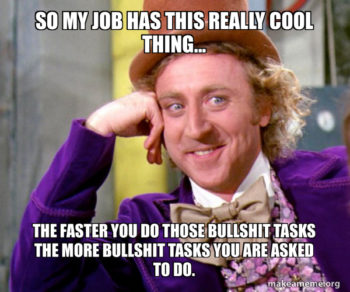I focus a great deal on the corporate world in this blog, notably on the special brand of ennui that cuts through that world. Given my focus in past posts on the need to organize workers in white collar industries, you might think I recommend the David Graeber book Bullshit Jobs whenever I get the chance. After all, it’s the best known popular critique of leadership and fluff in corporate land. It especially aims at pointless and/or socially negative elements, such as HR leaders, PR types, and lobbyists.
But you’d be wrong.
As I’ve mentioned before, Graeber’s best work is The Utopia of Rules. Recently, Matteo Tiratelli published an article in Catalyst that goes a long way toward explaining why. He effectively criticizes Graeber’s notion of ‘bullshit jobs‘ and points toward a better alternative.
Bullshit Jobs or Bullshit Tasks?
In his work Graeber makes a couple of key claims. First, he says bullshit jobs are on the rise. And, second, he says they’re located primarily in the corporate world. And he cites the kinds of jobs I listed above – PR people, HR, managers who do nothing but supervise others, lobbyists, and so on.
However, the empirical literature tells a different story. It finds that far more workers in low wage and low autonomy jobs report that they’re working bullshit jobs. Furthermore, the lit shows no pattern of increase in these kinds of jobs. If anything, as work moves away from manufacturing and toward tech, service, education, and health care sectors, those jobs appear at about the same rates or even at a slightly decreased frequency.
So, what gives? According to Tiratelli, the real issue isn’t bullshit jobs per se, but rather bullshit tasks within many different kinds of work. Lots of jobs – especially rank-and-file work in education and health care – carry lots of social value. Educator and nurse aren’t bullshit jobs at all. But those jobs have a ton of bullshit tasks that managers create in order to force workers to intensify their labor and monitor their own work.
Why does this happen? Because the underlying motivation of capitalism isn’t to create social value or socially useful work. Rather, it creates profitable work. Along the way, it maximizes managerial control.
Subjectivity
Tiratelli provide a compelling story for why Graeber misdiagnosed the problem. He points to Graeber’s subjective definition of ‘bullshit jobs.’ For Graeber, bullshit jobs are the ones where the people doing them report that the job fails to make a meaningful contribution to the world.
Clear enough. But, again, research shows that it’s not really corporate management types who say this. Often it’s people doing valuable work. Graeber’s subjective definition fails to explain the disconnect. Rather, he begins from the common anarchist assumption that the people closest to the work know the most about it and are best positioned to identify the problems.
I think that’s true most of the time. But a Marxist approach can show when it isn’t. And, more importantly why. The kinds of low wage, low autonomy workers who report bad things about their job certainly know what’s going on. They understand, at some level, that they and their co-workers can organize and run the work more effectively than their bosses.
But it’s not true for the kinds of corporate management employees Graeber has in mind. And his subjective definition of ‘bullshit jobs’ flops at incorporating this insight. Corporate propaganda often targets these very types of employees. In general, corporations control the bodies and work routines of low wage workers. But they focus on the minds of the higher ranks. They’ve initiated all of them into corporate ideology that tells them their work is socially useful. Even when – especially when – it isn’t.
Bullshit Tasks
As Tiratelli points out, there’s a big difference between a bullshit job and a bunch of bullshit tasks within a socially useful job. And we’d do well as leftists to sketch these out. A stock trader works a socially useless job whether or not they say it’s socially useless. And a teacher works a socially useful job that’s larded up with all kinds of bullshit admin tasks.
These facts provide useful tools to the leftist organizer. The organizer now has a compliment to provide to workers and a narrative to build around the workplace. The workers whose managers force them to monitor themselves with software, fill out forms to account for their time, and perform Taylorism on themselves are the very people who keep the world running. Their bosses just dicker around with data.
And it doesn’t need to be this way. Rather than falling into ‘anti–work‘ perspectives, we can use a positive vision of worker competence in our organizing efforts. Why does management need to exercise these forms of control? Why do we even need management at all? Not only do these forms of control harm the job and health of the worker, they’re not even better for the company itself in many cases. Workers could supervise themselves. They could exercise collective control over the work far better than so-called leaders.
Graeber Misses the Point
In focusing on bullshit jobs, Graeber misses the point. Yes, the capitalist system produces pointless work. There are bullshit jobs out there of the type that concern Graeber.
But by far the bigger issue is the endless list of bullshit tasks that capitalism generates for otherwise socially useful work and workers. Focusing on that issue allows us to better push for a system where workers run their workplaces.
